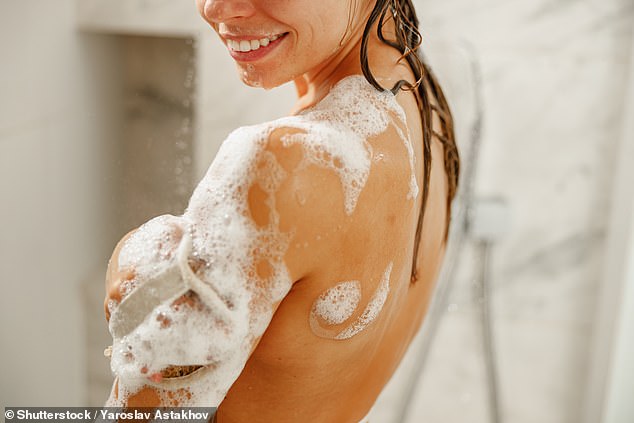We’ve all worried at some point: do I smell? With the rise of extreme hygiene routines on TikTok, a surge in sales of wet wipes and all-body deodorants, and the obsession with scented everything, it’s easy to feel paranoid about personal odour.
So, after yet another heatwave this summer and more expected before the cooler months arrive, what do you need to stay fresh and fragrant when the temperature is rising? Are we over-cleansing or under-scrubbing? Or are household habits the real culprit? We asked dermatologists, dentists and hygiene experts to sniff out the truth.
THREE SURPRISING FACTS ABOUT BODY ODOUR
1. You smell your age
As we age, we produce more of a compound called 2-nonenal. In tests, people could identify whether body odour came from someone over 75. The good news is that they rated it as more pleasant and less pungent than the smells emitted by younger people.
2. Stress smells like leeks
We make two kinds of body odour. The first is on the surface, involving sweat, sebum (an oily substance) and bacteria. The second is ‘skin gas’ emitted from inside our body.
Under psychological stress, people’s skin ‘emitted an odour similar to stir-fried leeks’, according to Japanese researchers in a study published by the US National Institutes of Health. The researchers said their findings indicated ‘the possibility of human nonverbal communication through odour’.
3. You may attract mosquitoes
Mosquitoes are drawn to people with higher levels of compounds called carboxylic acids in their skin’s sebum, which affects the way we smell, a Rockefeller University study found. The scent is imperceptible to humans but irresistible to the bugs. One person studied was 100 times more attractive to mosquitoes than others.

Hygiene experts share the importance of washing you and your things at the right frequency
BODY BASICS – FROM BITS TO PITS (AND BEYOND)
How much washing is enough?
According to Aleksandar Godic, consultant dermatologist at Stratum Clinics, you can forget obsessive cleansing rituals: a once-a-day scrub is enough to keep most people smelling sweet.
‘Focus on sweat-prone areas like underarms, groin, feet, and skin folds,’ says Dr Godic. ‘These are where odour-causing bacteria thrive.’
He advises using a gentle, non-fragranced soap or pH-balanced shower gel. There’s no strong evidence that antibacterial washes offer benefits for routine hygiene and overuse can irritate skin or disrupt the natural microbiome.
Dr Sasha Dhoat, consultant dermatologist at The Harley Street Dermatology Clinic, adds: ‘It’s bespoke – if you’re sweating, working out, or it’s a hot day, you may want to shower every day. But alternate days may suffice if you don’t sweat much or live in a cooler, drier climate. Aggressive over-washing can damage your skin’s barrier, our protective defence against the outside world. Five to ten minutes in the shower is ideal. If your feet go “pruney”, you’ve overdone it.’
Getting specific
- Underarms: If you don’t shave, you may need to wash more thoroughly and re-apply deodorant. Hair can trap odour-producing sweat and bacteria but doesn’t cause odour itself.
- Intimate hygiene: Consultant gynaecologist Dr Tania Adib says a healthy vaginal smell is simply your usual one. ‘Most women don’t notice their own smell as we are so used to it,’ she says. A strong or unusual odour may signal an issue such as bacterial vaginosis (BV), which is caused by an imbalance in your natural skin flora, STIs like gonorrhoea, or, very rarely, cervical cancer. Forgotten tampons can also be culprits. ‘If your odour changes, see your doctor.’ During menopause, vaginal dryness can increase the risk of developing BV. Moisturisers, topical oestrogen, HRT and sea buckthorn oil supplements may help. ‘Avoid perfumed soaps and gels – they can irritate sensitive skin,’ says Dr Adib. ‘Use the purest unscented soap or just water on the vulva. Even bland soap may be too abrasive for women with sensitive skin – use plain emollients like Cetraben or Hydromol. She adds: ‘The vagina – the internal part – is self-cleaning. Never douche. This strips away natural flora, ironically increasing the risk of an odour-causing imbalance.’
- Toilet talk: Moist toilet tissues have soared in popularity, but are they necessary? Julie Bowring, consultant gynaecologist at London Gynaecology, sounds a note of caution. ‘They can make you feel fresh and clean, but the colorectal surgeon I work with advises against wipes due to potential irritation caused by chemicals in them,’ she says. Dr Godic suggests opting for fragrance and alcohol-free wipes for sensitive skin. However, soft toilet paper followed by water is often gentler and more eco-friendly.
A breath of fresh hair
‘Your scalp is skin, and just like the rest of your body, it secretes sweat and sebum, sheds dead skin cells, and collects dust, dirt and bacteria,’ says Anabel Kingsley, lead trichologist at hair care brand Philip Kingsley. Hair can also trap smoke and cooking odours.
She recommends washing hair at least every three to four days or more frequently if you have fine or oily hair. ‘The idea that hair is self-cleaning is a myth,’ she says. ‘Fine hair means more individual hairs per square centimetre of the scalp. As every hair has its own oil gland, fine hair means more oil and often requires daily washing. Coarser or coil-textured hair can go longer between cleans as there are fewer hairs and, therefore, fewer oil glands on the scalp. To avoid limp locks when washing daily, use a volumising shampoo.’
The forgotten zones
- Feet: A bacterial breeding ground. Podiatrist Emma Supple says, ‘Don’t just stand there and let water run over them – scrub with a bristled brush and dry between toes.’
- Belly button: Often neglected. Dr Godic says: ‘Clean gently with a flannel or fingers. Don’t poke anything inside.’
- Behind ears: Another place where sebum and sweat can gather. Wipe gently during your regular wash.
- Nails and toenails: Scrub with a nail brush daily.
- Ears and nose: Clean the outer ear only. Never insert anything into the ear canal. Noses usually take care of themselves. Just wipe gently.
- Arms, legs and backs: Applying shower gel or soap with your hands is sufficient for daily cleansing, especially for sensitive or dry skin. Simply letting water run over the body may not be enough to remove oils, dirt, sunscreen or dead skin cells. A clean flannel or shower puff can help provide light exfoliation but should be washed and dried thoroughly after each use to prevent bacterial buildup.
People with sensitive skin, for example, anyone with eczema, should avoid scrubbing because they could damage the skin barrier function. A gentle lather and rinse is enough.
Natural and all-body deodorants: Do they work?
Natural deodorants can reduce odour by using baking soda or essential oils, but they don’t stop sweating. ‘They’re good for sensitive skin, but expectations should be realistic,’ says Dr Godic.
And what about spraying antiperspirant everywhere?
‘Definitely not advised,’ says Dr Dhoat. ‘These products are for underarms only. Using them on areas like the groin can cause irritation. However, products marketed as whole body deodorants are designed specifically with these broader application areas in mind.
These tend to use gentler formulations but because they avoid antiperspirant ingredients like aluminium salts, they won’t prevent sweating.
What about dry brushing?
‘Body brushing can be useful for exfoliation,’ says Dr Godic. ‘But it’s not necessary for hygiene and should be done gently to avoid damaging the skin barrier.’
Bad breath: It’s not always about teeth
‘A dry mouth allows bacteria to breed, especially when food debris isn’t washed away,’ says Dr Sam Jethwa, president of the British Academy of Cosmetic Dentistry. Chewing sugar-free gum and drinking fluids helps.
‘Bad breath can be linked to gastric reflux, high-acid diets, or gut bacteria,’ he adds. ‘Dairy and high-protein foods release amino acids that feed bacteria on the tongue, while acidic foods like tomatoes or citrus encourage bacterial growth. Pregnancy can also trigger odours due to hormonal shifts, dehydration or morning sickness.
‘If your breath smells like rotten eggs, the issue may be gastrointestinal. If changes in hygiene and diet don’t help, see a dentist or doctor.’
- Floss once or twice daily between every tooth to loosen any trapped food, a common cause of smells. Then brush afterwards for two minutes to whisk any debris away.
- Replace toothbrush heads every three months or whenever bristles look splayed, worn down or have become stiff.
- Brush your tongue or use a tongue-scraper. ‘But only use light pressure to avoid damage to the taste buds,’ says Dr Jethwa.
- See your hygienist twice a year.
Any quick fixes? ‘Swill water after eating,’ says Dr Jethwa, adding: ‘Apples help clean teeth and boost saliva.’

Dr Lisa Ackerley, hygiene expert
HOUSEHOLD HYGIENE
Sometimes, it’s not you – it’s your stuff. Dr Lisa Ackerley, a chartered environmental health practitioner known as The Hygiene Doctor, says cleaning mistakes may make us smellier than we realise.
Laundry lowdown
Low-temp washes and non-bio detergents may be gentle and eco-friendly but less effective at removing odour.
‘You may not get the smells out properly,’ says Dr Ackerley. Washing gym gear, dog blankets and towels with other clothes can cross-contaminate them with bacteria and odours.
Body heat activates smells trapped in fabric, especially in gym clothes made from moisture-wicking synthetic fabrics. These absorb oils, sweat and bacteria, worsening over time. Dr Ackerley advises turning them inside out to expose oils and sweat to detergent and washing them immediately.
‘Use a 60–90C wash to kill bacteria,’ she says. ‘For delicates or low-temperature washes, consider adding a laundry sanitiser. Bio powders are more effective than liquids as they contain stain-removing enzymes, and powders for whites often contain bacteria-busting bleach.’
If your washing machine is smelly, all your clothes will smell too. It often happens because we only use the cool wash setting, which allows bacteria and yeasts to flourish.
Run a hot wash or use a washing machine cleaner once a month or at the first sign of a whiff and wipe the rubber seal with antibacterial spray.
Line drying makes clothes smell fresher. Leaving slightly damp clothes piled up in a warm tumble dryer can create musty odours. If you tumble dry, remove and air clothes immediately.
Is your dog making you smell?
‘I have a dog that I walk on the beach daily,’ says Dr Ackerley. ‘So I know that even a fairly clean wet dog smells bad. Your car or sofa can absorb that smell, and, in turn, so can you.’
Dr Ackerley recommends using dog-drying coats made of towelling as well as washing dog towels at high temperatures or with a sanitiser.
Makeup bag mayhem
- Makeup brushes: Clean weekly.
- Hairbrushes: Remove hair daily; wash monthly.
Bathroom basics
- Towels: Wash every 3 uses and air thoroughly.
- Flannels: One use only. Don’t use body flannels on your face. Wash in hot water weekly.
- Toothbrush holders and soap dishes: Clean weekly – they accumulate grime quickly.
Bedroom habits
- Pillows: Wash quarterly according to the label instructions or replace yearly. Use pillow protectors to keep them cleaner.
- Sheets: Change weekly, more often if you’re sweaty or unwell, as bacteria and viruses can linger. Mattress protectors are another essential.
- Pyjamas: If you shower at night, wash every 2–3 wears. Change bottoms daily if you go commando.
CLOTHING & ACCESSORIES
- Socks and underwear: One wear only.
- Bras: Every 3–4 wears. More often in hot weather.
- T-shirts: After every wear.
- Jeans: Every 4–5 wears unless visibly dirty.
- Swimwear: Rinse every time. Wash properly after two wears.
- Summer dresses: Every 1–2 wears, depending on heat and sweat.
Accessories and summer gear
- Sun hats: Wipe the band with mild soap or replace annually.
- Sunglasses: Wipe daily; clean weekly with mild soap.
- Totes and beach bags: Empty and then clean with an antibacterial wipe. ‘Some people’s bags are disgusting, inside and out,’ says Dr Ackerley. ‘People put all sorts of things in them, from half-eaten sandwiches to dog balls. No wonder they get smelly. A top tip is not to put bags on the floor, especially in public areas such as on transport and in toilets. If you do, don’t throw them on your bed and definitely don’t put them on a kitchen counter, which I’ve seen people do.’
- Smelly sandals: That black gunk? ‘It’s sweat, skin, dirt and bacteria,’ she says. Wipe footbeds with a damp cloth and soap from time to time. Allow to dry thoroughly before reuse.












